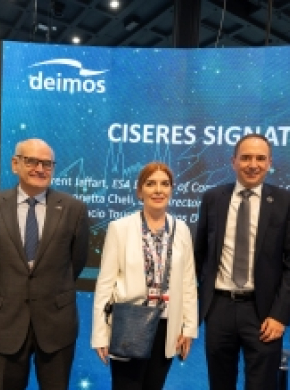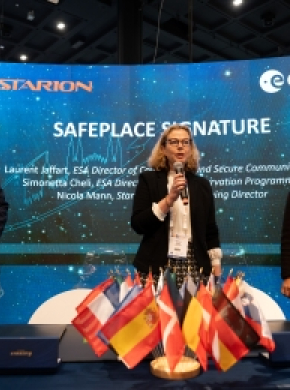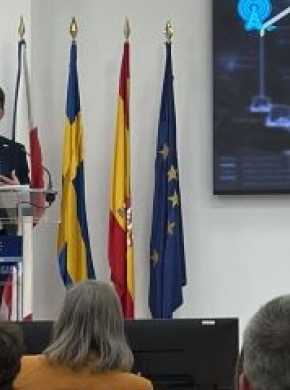In recent years, Europe has been facing a growing number of natural and human-made crises, with devastating consequences. The frequency, duration and intensity of these extreme events is also increasing as a result of global warming and instable geopolitical situations, which raises the need to act to mitigate their impact. The recent sixth report of the Intergovernmental Panel on Climate Change (IPCC) raises awareness on the escalation of climate-related risks as well as their interaction with non-climatic risks “creating compound and cascading risks that are more complex and difficult to manage”.
In this context, space systems and services provide helpful solutions that can be exploited by decision-makers and first responders alike. But to maximise their value, space data need to be provided in a timely and secure manner.
Nowadays, one of the main challenges and opportunities lies in a paradox: an enormous amount of data is already available, but the difficulty of processing this and distributing it swiftly is still an obstacle preventing this data being used effectively and efficiently. Furthermore, improving the interoperation between the existing systems and enhancing and integrating them with new capabilities represents a challenge worth addressing, as a solution to this issue will further enrich the applicability of space-based solutions.
Commercial players are already developing space-based solutions to support civil security operations on Earth in a growing number of areas. Nevertheless, limited awareness about the solutions by the end users restricts the uptake of such solutions by players in the security sector. Finally, even when users are aware of the benefits of space, their needs may not currently be addressed.
In this context, taking into account the benefits of setting up an initiative and the implications of not taking action, ESA has decided to establish the Civil Security from Space (CSS) Programme, which received the support of its Member States at the ESA Council at Ministerial Level in November 2022.
Principles of the Programme
The overarching goal of the Programme is to rely on, leverage and enhance existing capabilities to quickly develop solutions serving current civil security needs, while also fostering new innovative capabilities in the longer term.
To fully express its potential, creating significant benefits for the stakeholders involved and for society as a whole, three main principles are at the core of the CSS Programme:
- Broad involvement of users
-
The user community has been involved since the very first phases of the Programme in the definition of the overarching objectives and has been integrated in many of the consortia which are providing initial proposals for future systems. Proactive and continuous user engagement activities are carried out throughout the Programme.
- Co-funding projects with industry
-
The co-funding mechanism allows the assessment of interest of both industry and the market on the different solutions proposed, and the response to the clear willingness by industry stakeholders to partner. R&D up to IOD/IOV activities conducted under the CSS Programme boost the return on investment for European industry.
- Building symbiotic partnerships
-
Public and private stakeholders continuously work together towards the same goals. Public entities build on up-to-date user needs to set their objectives; private players provide swiftly actionable solutions as required. Collaboration is strengthened through implementation at European level.
Objectives:
CSS activities, which support R&D up to IOD/IOV for the benefit of industry and institutional stakeholders, are driven by a set of clear and ambitious objectives:
- Develop concrete solutions provided by commercial players to end users in a short timeframe. The Programme has a focus on fostering interoperability between existing systems and facilitating the creation of partnerships between stakeholders of different natures. The definition of common standards, which will facilitate interconnectivity of various systems to cope with the urgency, is also paramount.
- Ensure ubiquitous up-to-date data availability concerning crisis management, offered through global space-terrestrial communications systems, compliant with integrity, resilience and reliability standards.
- Provide efficient data fusion and processing solutions to fully exploit the significant amount of data available through various sources, thus generating actionable information.
NEWS AND EVENTS
The European Space Agency (ESA) and the International Committee of the Red Cross (ICRC) have signed a Memorandum of Intent (MoI) to collaborate on supporting the development and increased use of space-enabled solutions.
ESA bolsters Estonian and Baltic emergency response
ESA’s Civil Security from Space programme is working to support governments in the event of large-scale civilian evacuations, ensuring authorities are equipped and prepared in times of crisis.
ESA’s Smart-Connect expands to drive disaster response capabilities from space
ESA’s Smart-Connect project, as part of ESA’s Civil Security from Space (CSS) programme, is expanding its capabilities in meeting the challenges faced when terrestrial telecommunications channels are disrupted during…
ESA to leverage AI-enabled satellite for disaster response
ESA is using the ever-increasing capabilities of artificial intelligence (AI) to enhance Europe’s ability to respond more effectively and quickly to civil security and disaster situations.
ESA to enhance space-enabled crisis management with Safeplace
ESA, in partnership with a Starion-led industrial consortium, launched a project to develop a new space-enabled service for crisis response.
European Space Agency introduces industry-driven partnership for resilient connectivity during…
The European Space Agency (ESA) has launched a new partnership with an industrial consortium through a project called Smart-Connect, which aims to mitigate the challenges presented when existing telecommunication channels are…
Experts meet in Madrid to define new Space Data Space
As the impact of geopolitical tensions and climate change challenges continue to be felt around the world, key players in Europe’s space sector came together in Spain last week to define the requirements of a future Space Data Space system for…
NOW CLOSED: RFI Call for Civil Security from Space - A Necessity for Europe
‘Civil Security from Space’ is proposed to be a federated solution interconnecting space and ground systems and services, existing, planned and future.









